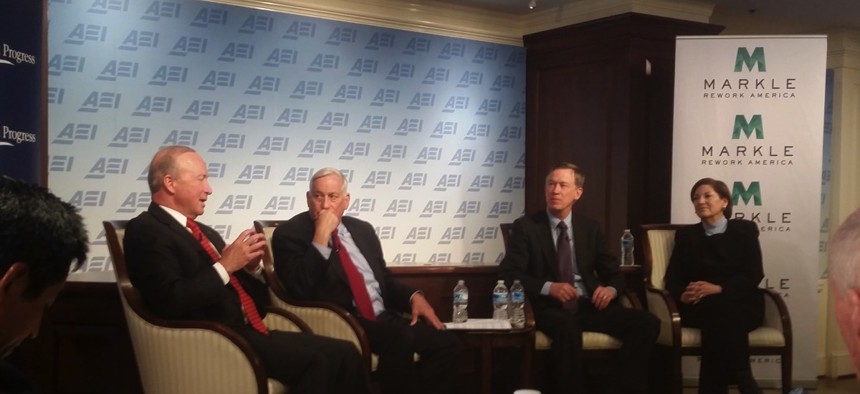Why States Want Skills-Based Job Markets Amid Globalization and Digitalization

From left to right: Purdue President and former Indiana Gov. Mitch Daniels, Aspen Institute President and CEO Walter Isaacson, Colorado Gov. John Hickenlooper, and Markle Foundation President and CEO Zoë Baird. Dave Nyczepir / Route Fifty

Connecting state and local government leaders
During a panel discussion in D.C., Colorado’s governor and Indiana’s former governor show why states are often better than the feds at adapting policies to fit the changing digital economy.
WASHINGTON — Globalization and technology marginalize an increasing number of workers daily, so states like Colorado want to break jobs down by required skills to more easily train their labor forces.
The Centennial State has teamed with the Markle Foundation and LinkedIn on a skills-based hiring platform for the 70 percent of people in the U.S. lacking college degrees, despite more jobs demanding them.
SKILLFUL, as the initiative’s called, aims to create a skilled jobs market for the middle class while helping workers get the rapid, on-the job training, apprenticeships or education they need to stay competitive.
“Too much of that preparation hasn’t focused on career,” said Colorado Gov. John Hickenlooper, during a panel discussion Monday afternoon at the American Enterprise Institute in the nation’s capital. “And career is really about skills.”
Wal-Mart trains its employees to run inventory, Hickenlooper said, but no program until SKILLFUL compiled that information and showed workers what other skills they’d need to transition into successful careers in banking, advanced manufacturing or insurance.
Colorado has about 24,000 jobs, many in tech, waiting to be filled if only the state can train or retrain workers in six months to a year for positions paying up to $70,000 annually, the governor said.
Purdue University President and former Indiana Gov. Mitch Daniels, also on Monday’s “Labor Market for the Digital Age” panel, blamed the erosion of social capital and automation for recent workforce challenges. Retail, food service and call center jobs are in high supply, Daniels said, but they’re also the most easily automated.
“I was raised to think the most predictive variable in politics was the unemployment rate,” he said. “I think it’s the most meaningless today.”
Daniels is part of the New York City-based nonprofit Markle Foundation’s Rework America effort, one goal of which is to make it easier for small and medium-sized businesses to sell into global markets to grow faster. To do that, they need to be part of a system using the same data analytics available to big businesses, said panelist Zoë Baird, the foundation’s president and CEO.
“Everyone should have access to that granular knowledge to help grow their business,” Baird said.
Some states are doing a better job than the federal government of updating their policies to fit the new digital economy, she added, a “fundamental values question” that isn’t being discussed at the national level.
Purdue has about 30,000 undergrads, 85 percent of which are domestic—compared to 55 percent at the graduate level. Around 15 to 20 percent of international students remain in the country after graduating, the Republican former governor said, and more would stay if the federal government reformed its visa policies.
In Colorado, school districts have greater flexibility than many to modify their curriculums to, say, begin teaching coding to sixth graders, Hickenlooper said.
The Democratic governor has made a point of targeting millennial workers, which began while he was still mayor of Denver. Believing young graduates go where they want to live, rather than where the work is, Hickenlooper saw the Mile High City metro surpass Nashville, Tennessee, and Austin, Texas, in number of live music venues and establish around 1,000 miles of bike trails.
Some might view such amenities as superfluous, he said, but improving urban quality of life is critical to attracting a younger labor force.
Also important is not making hiring processes too “onerous,” Daniels said.
SKILLFUL can take even a biotech job asking for college-educated applicants and show all that’s really needed is an associate’s degree and two biology courses by reducing the position to skills. Those candidates will be cheaper to hire than those with college and graduate degrees, too.
“Employers are more and more not going to ask for a specific, generic document,” Hickenlooper said.
Despite the need for new infrastructure at the state and local levels, Daniels said, the jobs that spawns can’t be relied on to combat unemployment in the digital age.
Construction jobs are often few and specialized.
“You want to know a high-skill job?” Daniels said. “Try driving a bulldozer.”
Dave Nyczepir is a News Editor at Government Executive’s Route Fifty.

NEXT STORY: Virginia’s New IT Procurement Vehicle Paves the Way for the ‘Internet of Things’





